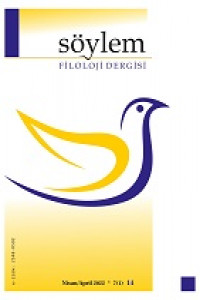İyi Niyetli Şehzade ve Kötü Niyetli Şehzade Hikayesinde İyi-Kötü Göstergelerinin Dil-Söz Bağlamında İncelenmesi
Abstract
Türk topluluklarının din etkisi ile dünyaya bakış açısında önemli değişiklerin gerçekleştiği dönemlerden biri de Uygur Dönemi’dir. Bu dönemde oluşan yeni kültürü; yeni bir din ve onun gereklilikleri çevresinde oluşturulmuş, Türk topluluklarının eski gelenek, yaşantı ve kültürleriyle beraber yoğrulmuş bir sentez olarak değerlendirebiliriz. Bu yeni kültür, bu dönemde ortaya konmuş olan yazınsal türlere hem içerik hem de ifade biçimi olarak katkı sağlamış ve zengin bir yazınsal türün oluşmasına zemin hazırlamıştır. Bu yazınsal tür sadece din ve kültür motiflerinin yer aldığı, toplumsal düzen ile ilgili söyleyişlerin ifade edildiği metinler değildir. Bu metinlerle aynı zamanda bir uygarlığın dünya görüşü ve hayat felsefesi de ifade edilmiştir. Uygur döneminde bu düşünce ve felsefe ile ortaya konan eserlerden biri de İyi Niyetli Şehzade ve Kötü Niyetli Şehzade hikayesidir.
Bu öyküde iyilik ve kötülük gibi iki zıt kavram, karakterlerin dünya görüşü ve hayatı algılama biçimi çerçevesinde anlatılmıştır. Bu çalışmada bu iki zıt kavram Saussure’nin dil-söz kuramı ile ele alınacaktır. Bir dilbilimci olan Saussure’ün dil bilimi anlayışı dil (langue) ve söz (parole) ayrımı üzerinden daha iyi anlaşılabilir. Saussure göre söz, dilin somut kullanımıdır; uygulanışıdır. Dil ise onu belirleyen, arka plandaki toplumsal yapıdır; sistemdir. Saussure, dil ve sözü homojen bir bütünlük oluşturan kavramlar olarak ele almaz, yapısı gereği ikisinin aynı teoriyle çözümlenemeyecek farklılıklar taşıdığına dikkat çeker ve ayrı olarak incelenmesi gerektiğini belirtir. Bu bakış açısından hareketle, bu metindeki iyi ve kötü kavramlarının arkasındaki derin yapı ifade edilmeye çalışılacaktır.
Keywords
Dilbilim Saussure dil-söz Uygur dönemi İyi Niyetli Şehzade Kötü Niyetli Şehzade Uygurca eski Türkçe Lacan
References
- Caferoğlu, Ahmet (2000). Türk Dili Tarihi (4. Baskı). İstanbul: Enderun Kitabevi.
- De Saussure, Ferdinand (2001). Genel Dilbilim Dersleri. Berke Vardar (Çev). İstanbul: Multilingual.
- Rifat, Mehmet (1998). XX. Yüzyılda Dilbilim ve Göstergebilim Kuramları 1. Tarihçe ve Eleştirel Düşünceler. İstanbul: Yapı Kredi Kültür Sanat Yayıncılık.
- Seçkin, Pelin (2020). Türkçede Olumsuzluk Algısı. Konya: Palet Yayınları.
- Tokyürek, Hacer (2021). Eski Uygurca İyi ve Kötü Prens Öyküsü’nde Kahramanın Yolculuğu. İnternational Journal of Old Uyghur Studies. C. 3. S.2, s. 177-216
- Tulum, Mehmet Mahir ve Azılı Kenan (2015). Eski Uygurca Edgü Ögli Tigin Anyıg Ögli Tigin (İyi Niyetli Şehzade-Kötü Niyetli Şehzade) Burkancı Seyirlik Eser. Ankara: Doğu Kütüphanesi.
- Yunusoğlu, Mağfiret Kemal (2020), Budist Türk Çevresi Eserlerde Metaforlar. Ankara: Türk Dil Kurumu Yayınları.
- Yüksel, Ufuk S. (2019). Saussure’ün Dil Bilimi Düşüncesi. Onto Online Psikoloji Dergisi. S. 17, s. 15-19.
Analysis Of Good-Bad Signs In “God Willed Prince and Evil Prince” Story Within the Context of Langue-Parole
Abstract
The Uyghur Period is a significant period during which the Turkic peoples transitioned into settled life under the influence of religion and drastic changes in their world view took place. The new culture emerging in this period can be regarded as formed in the light of a new religion and its requirements, and molded under the influence of the former traditions, lifestyles and cultures of the Turkic peoples. This new culture contributed to the literary genres produced in this period in terms of content and style and paved the way for the formation of a rich literary genre. This literary genre does not consist only of religious and cultural motifs, or texts through which views of social order were communicated. Through these texts, the world view and life philosophy of a civilization were also expressed. One of these texts produced in this way is “The Good Prince and The Bad Prince” story.
Two opposing concepts, goodness and badness are recounted in line with the characters’ world view and perception of life. In this study, these opposing terms will be analyzed by drawing on Saussure’s concepts of langue and parole. Saussure’s approach to linguistics can be better understood through an insight into langue/parole binary. According to Saussure, parole is the concrete use and practice of langue. Langue is, on the other hand, the social structure, system determining parole in the background. Saussure does not treat langue and parole as a homogenous unity, totality since they bear remarkable differences structurally, which hinders analyzing them with the same theory. Therefore, they should be analyzed separately. Based on this approach, this study will reveal and discuss the deep structure behind the concept of good and bad in this text.
Keywords
Linguistics Saussure Langue-Parole Uyghur period “The Good Willed Prince and The Evil Prince” Uyghur Texts Lacan old Turkish
References
- Caferoğlu, Ahmet (2000). Türk Dili Tarihi (4. Baskı). İstanbul: Enderun Kitabevi.
- De Saussure, Ferdinand (2001). Genel Dilbilim Dersleri. Berke Vardar (Çev). İstanbul: Multilingual.
- Rifat, Mehmet (1998). XX. Yüzyılda Dilbilim ve Göstergebilim Kuramları 1. Tarihçe ve Eleştirel Düşünceler. İstanbul: Yapı Kredi Kültür Sanat Yayıncılık.
- Seçkin, Pelin (2020). Türkçede Olumsuzluk Algısı. Konya: Palet Yayınları.
- Tokyürek, Hacer (2021). Eski Uygurca İyi ve Kötü Prens Öyküsü’nde Kahramanın Yolculuğu. İnternational Journal of Old Uyghur Studies. C. 3. S.2, s. 177-216
- Tulum, Mehmet Mahir ve Azılı Kenan (2015). Eski Uygurca Edgü Ögli Tigin Anyıg Ögli Tigin (İyi Niyetli Şehzade-Kötü Niyetli Şehzade) Burkancı Seyirlik Eser. Ankara: Doğu Kütüphanesi.
- Yunusoğlu, Mağfiret Kemal (2020), Budist Türk Çevresi Eserlerde Metaforlar. Ankara: Türk Dil Kurumu Yayınları.
- Yüksel, Ufuk S. (2019). Saussure’ün Dil Bilimi Düşüncesi. Onto Online Psikoloji Dergisi. S. 17, s. 15-19.
Details
| Primary Language | Turkish |
|---|---|
| Subjects | Language Studies |
| Journal Section | DİLBİLİM / ARAŞTIRMA MAKALELERİ |
| Authors | |
| Publication Date | April 29, 2022 |
| Submission Date | February 23, 2022 |
| Acceptance Date | March 22, 2022 |
| Published in Issue | Year 2022 Volume: 7 Issue: 1 |

This work is licensed under a Creative Commons Attribution-NonCommercial-NoDerivatives 4.0 International License.


